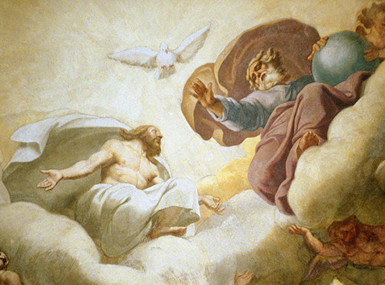There is a sense of closure about this feast of the Holy Trinity, at least in terms of major celebrations. We have journeyed through salvation history, from Ash Wednesday to Pentecost, commemorating the life, death and resurrection of Jesus, his ascension to the Father, and the sending of the Holy Spirit.
Today we summarize all of these events in terms of how they help us understand the mysterious nature of our God, and his presence in our world and in our lives.
 Our God is personal, and intimately bound up in who we are and what we do. We acknowledge Him as Creator and Lord, as architect of the universe and author of life ...but He is much more. His Word became flesh so that He could enter fully into all of the dimensions and experiences of our human journey in the person of Jesus, son of Mary... but He is much more.
Our God is personal, and intimately bound up in who we are and what we do. We acknowledge Him as Creator and Lord, as architect of the universe and author of life ...but He is much more. His Word became flesh so that He could enter fully into all of the dimensions and experiences of our human journey in the person of Jesus, son of Mary... but He is much more.
He preached a gospel of compassion and unconditional love, and struggled fiercely against the evils of injustice and all of the forces that debase the quality of life and demean the human spirit.... but He was much more.
He was seemingly overcome and destroyed by these forces, but the power of his faith and of the Father's love turned this defeat into the victory of the resurrection... but He is much more.
He promised, then sent His Spirit to anoint, consecrate and live on in all who would come to believe in Him as Messiah and Lord, so that they would be witnesses in each generation to the God who is Father, Son and Spirit.
The plurality of persons in the Triune God is simply the result of divine love that is so intense and so profound that it cannot be contained or defined in one dimension. It is a love that not only creates, but a love that redeems and sanctifies. It is a love that brings light and warmth to the dark side of our journey. It is a love that is constantly healing our brokenness, lifting us above selfishness, and reaching out to save us when we edge toward the abyss of despair. It is a love that engenders hope and courage; it is a love that helps us to maintain a sense of purpose and peace in our lives.
When we examine our own relationship, both with God and with neighbor, we certainly realize how difficult it is for us to imitate the love of Jesus. Usually, our love is very imperfect. It can be colored by fear, by same hidden motive, by selfishness. Often, our love is conditional... we only love those whom we like, or those who earn our love by pleasing us. Our love is fragile and sensitive. It withers and dies if we are hurt or misunderstood. Or we simply get tired of giving; we grow weary of preferring others to ourselves.
How many people can you think of who offer pure, unconditional love? How many folks do you know who keep giving of themselves without ever counting the cost, without ever looking for a reward? How often can we say that our own love is totally unselfish?
The love of Jesus is modeled on the love of God. It is a human translation of that love - universal, unwavering, relentless. It will always be a challenge for us, an ideal for which we strive. Jesus Himself nourishes and purifies that love - if we let Him - day by day. And, our love will be finally and fully like His when we share the glory of His resurrection and see our God face to face.
Yes, our God is a mystery, invisible, and transcendent - but He is not just a thing, a force, a super intellect, a remote manipulator of people and history. He is so much more; through faith He reveals himself to us every day and every moment - through the Word and sacrament that nourish us in the community of the church, through the people and events that are constant reminders of his goodness, and ultimately through that deep inner awareness and absolute assurance of being loved uniquely and forever by our Triune God, whom we continue to praise and worship always in the name of the Father and of the Son and of the Holy Spirit. AMEN





